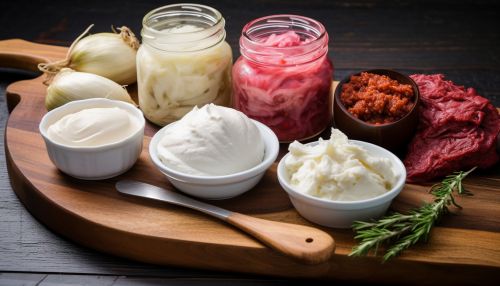Probiotics and Gut Health
Introduction
Probiotics are live microorganisms that, when ingested in adequate amounts, confer a health benefit to the host. They are often consumed in fermented foods with active live cultures such as yogurt, or as dietary supplements. The concept of probiotics is not new, with fermented products being consumed for their health benefits for thousands of years.


Probiotics and Gut Health
The human gut is more than just a system for digestion. It is a complex ecosystem of microorganisms known as the gut microbiota, which plays a crucial role in our health. Probiotics can influence the balance of this microbiota, potentially leading to improved gut health.
The Gut Microbiota
The gut microbiota is a complex community of microorganisms that live in our digestive tracts. This community is made up of bacteria, viruses, fungi, and other microorganisms, with bacteria being the most studied. The gut microbiota plays a vital role in human health, including digestion of food, synthesis of vitamins, and protection against pathogens.
How Probiotics Work
Probiotics work by interacting with the gut microbiota and the host's immune system. They can alter the composition and/or activity of the gut microbiota, compete with pathogens for nutrients and binding sites, enhance the gut barrier function, and modulate the immune response.
Types of Probiotics
There are many different types of probiotics, each with their own potential health benefits. Some of the most well-known include Lactobacillus, Bifidobacterium, and Saccharomyces boulardii.
Lactobacillus
Lactobacillus is a genus of bacteria that is commonly found in the human gut and in fermented foods. There are many different species of Lactobacillus, each with their own potential health benefits.
Bifidobacterium
Bifidobacterium is another genus of bacteria that is commonly found in the human gut. Like Lactobacillus, there are many different species of Bifidobacterium, each with their own potential health benefits.
Saccharomyces boulardii
Saccharomyces boulardii is a yeast that is used as a probiotic. It is unique among probiotics in that it is a yeast rather than a bacterium.
Health Benefits of Probiotics
Probiotics have been studied for a wide range of health benefits, including improved digestion, enhanced immune function, and reduced risk of certain diseases.
Improved Digestion
Probiotics can help to improve digestion by enhancing the function of the gut microbiota. They can help to break down food, absorb nutrients, and prevent the growth of harmful bacteria.
Enhanced Immune Function
Probiotics can also enhance immune function by modulating the immune response. They can stimulate the production of antibodies, enhance the activity of immune cells, and reduce inflammation.
Reduced Risk of Certain Diseases
Some studies have suggested that probiotics may reduce the risk of certain diseases, such as irritable bowel syndrome (IBS), inflammatory bowel disease (IBD), and certain types of cancer.
Safety and Side Effects
While probiotics are generally considered safe for most people, they can cause side effects in some individuals. These can include digestive symptoms such as gas and bloating, as well as more serious complications in people with weakened immune systems.
Conclusion
Probiotics have the potential to improve gut health by influencing the gut microbiota and the immune system. While more research is needed to fully understand their benefits and risks, they are a promising area of research for improving human health.
